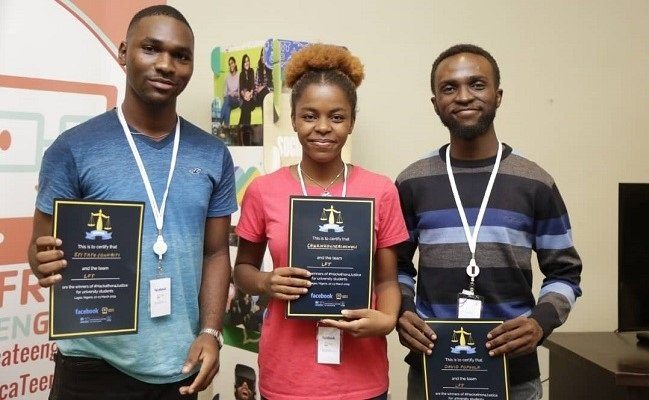Three Nigerian students have reportedly invented a software that can track and expose human traffickers as well as rescue and rehabilitate victims.
David Popoola, Eyitayo Ogunbiyi and Chukwudumebi Onwuli, students of System Engineering and Computer Engineering Departments at the University of Lagos, Nigeria, developed the software called ‘Let’s Fight Trafficking’ to help tackle the problem of human trafficking in the West African nation.
The three undergraduates developed the software after close to 30 hours of coding at a coding competition organized by the United Nations Office on Drug and Crime in partnership with Facebook and Africa TeenGeeks.
The students emerged winners of #Hackathon4Justice event held in Lagos between March 22 and 23, 2019. The event was designed to spur young people’s coding capabilities and at the same time push them to be creative.

Apart from exposing human traffickers, the software can be used to create awareness about the trafficking industry. “The trio’s web application design can help both trafficked victims and their loved ones learn about human trafficking and access to tools that can potentially save them,” Mr Sylvester Atere, the Outreach and Communication Officer at United Nations Office on Drug and Crime (UNODC) said.
The innovation has a heat map, generated from report data to let users know where trafficking is most prevalent and take preventive measures, according to Mr. Atere.
The coding marathon was part of UNODC’s Education for Justice (E4J) initiative, a component of the Global Programme for implementation of the Doha Declaration and the trio led the pack of upcoming professionals.
The ‘Let’s Fight Trafficking’ key features include an e-learning planning platform to help educate people on human trafficking; a facial recognition system that matches feed from webcams.
There are also other images to see if there already exists a reported case with a similar image in the database and a portal for victim’s close friends to file reports about trafficking cases in their area.
Human trafficking earns global profits of roughly $150 billion a year for traffickers, $99 billion of which comes from commercial sexual exploitation. Globally, an estimated 71% of enslaved people are women and girls, while men and boys account for 29%.
Human trafficking is considered modern-day slavery and there are more slaves today than at any time in history. Hopefully, this new innovation will go a long way to help African countries combat the persistent form of slavery disguised as human trafficking.










